LCBB6002 - BP Case Study: International Financial Management
VerifiedAdded on 2023/06/17
|5
|898
|170
Case Study
AI Summary
This case study examines British Petroleum's (BP) international financial management strategies, specifically focusing on the company's decisions regarding debt financing from international markets. It critically analyzes the reasons why BP might seek debt outside its home country, considering factors such as lower interest rates and investment opportunities. The report also evaluates the potential advantages for BP's management in leveraging interest rate parity (IRP) across different nations. It concludes by weighing the pros and cons of international debt versus domestic debt, suggesting that while international debt can be profitable, prioritizing domestic debt might be more beneficial for the host country's economy. Desklib offers a wealth of similar case studies and resources to support students in their academic pursuits.
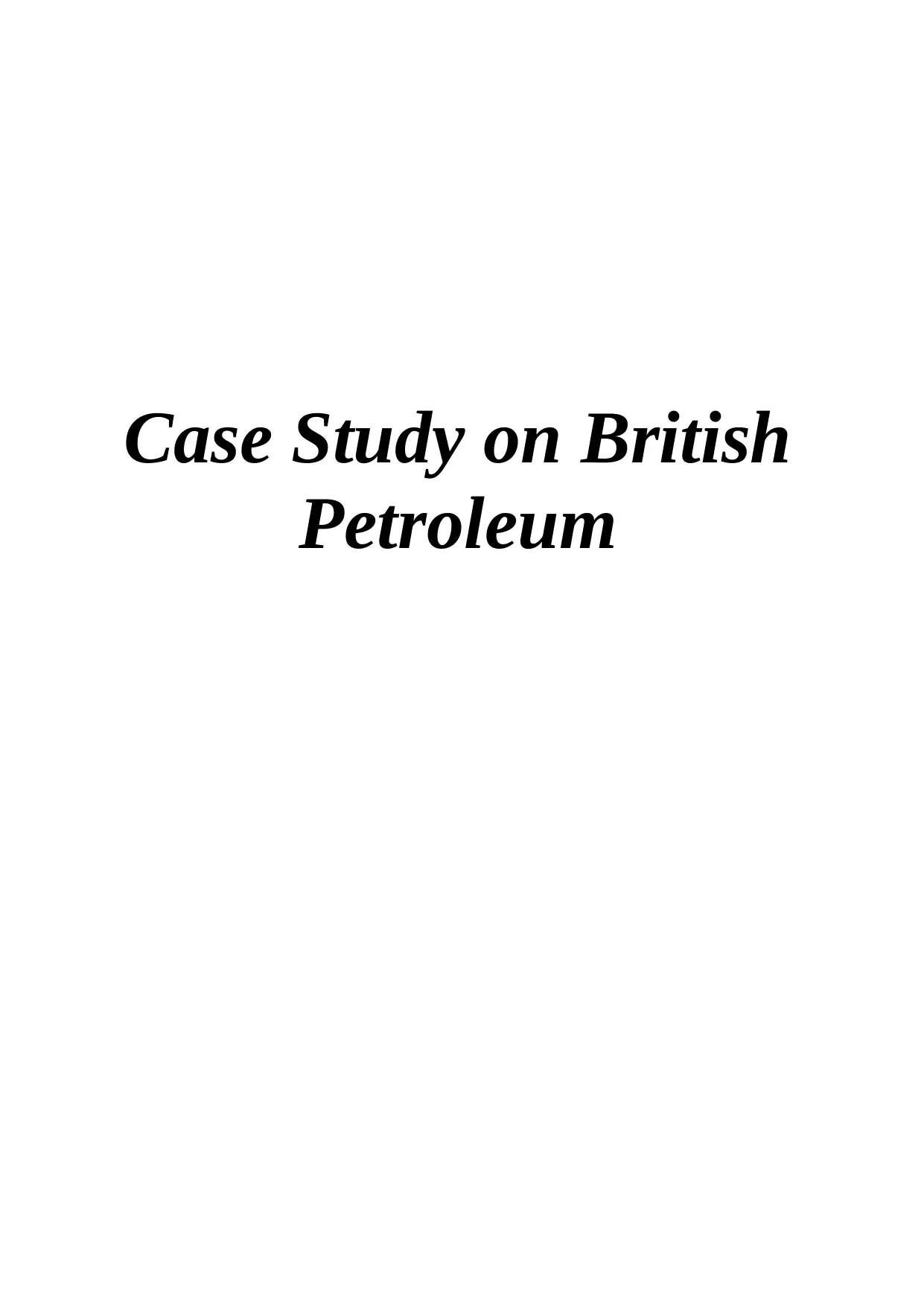
Case Study on British
Petroleum
Petroleum
Paraphrase This Document
Need a fresh take? Get an instant paraphrase of this document with our AI Paraphraser
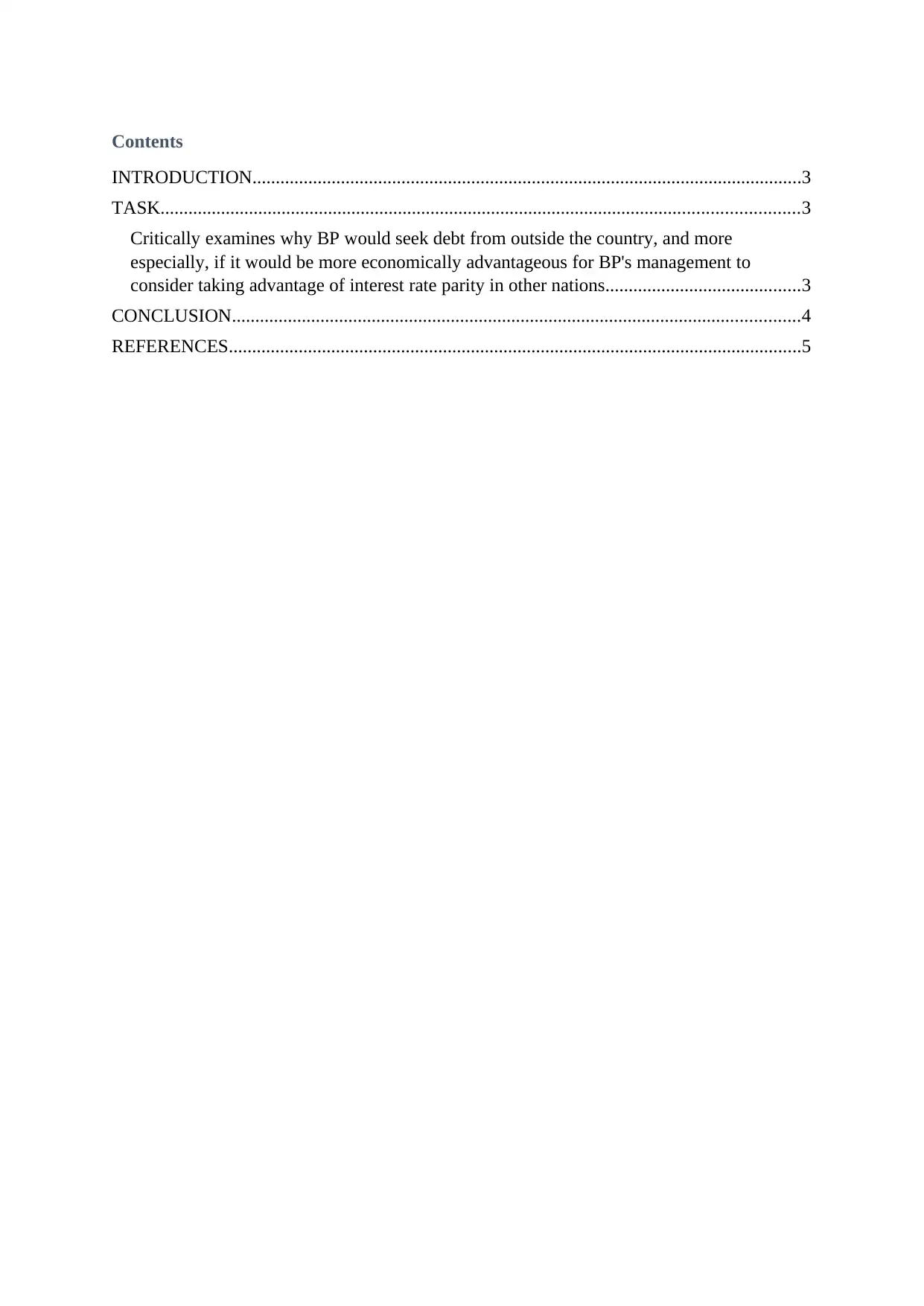
Contents
INTRODUCTION......................................................................................................................3
TASK.........................................................................................................................................3
Critically examines why BP would seek debt from outside the country, and more
especially, if it would be more economically advantageous for BP's management to
consider taking advantage of interest rate parity in other nations..........................................3
CONCLUSION..........................................................................................................................4
REFERENCES...........................................................................................................................5
INTRODUCTION......................................................................................................................3
TASK.........................................................................................................................................3
Critically examines why BP would seek debt from outside the country, and more
especially, if it would be more economically advantageous for BP's management to
consider taking advantage of interest rate parity in other nations..........................................3
CONCLUSION..........................................................................................................................4
REFERENCES...........................................................................................................................5
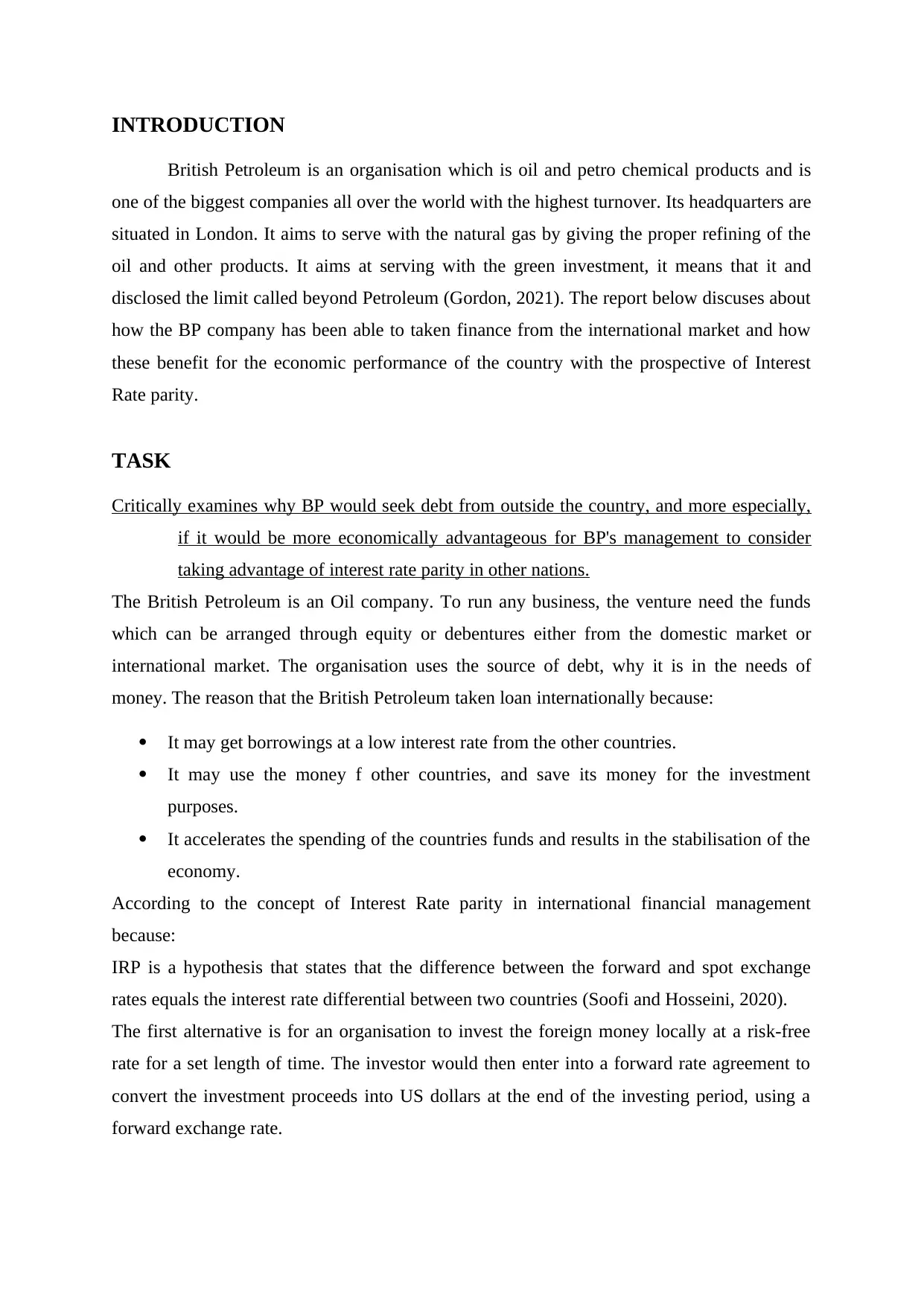
INTRODUCTION
British Petroleum is an organisation which is oil and petro chemical products and is
one of the biggest companies all over the world with the highest turnover. Its headquarters are
situated in London. It aims to serve with the natural gas by giving the proper refining of the
oil and other products. It aims at serving with the green investment, it means that it and
disclosed the limit called beyond Petroleum (Gordon, 2021). The report below discuses about
how the BP company has been able to taken finance from the international market and how
these benefit for the economic performance of the country with the prospective of Interest
Rate parity.
TASK
Critically examines why BP would seek debt from outside the country, and more especially,
if it would be more economically advantageous for BP's management to consider
taking advantage of interest rate parity in other nations.
The British Petroleum is an Oil company. To run any business, the venture need the funds
which can be arranged through equity or debentures either from the domestic market or
international market. The organisation uses the source of debt, why it is in the needs of
money. The reason that the British Petroleum taken loan internationally because:
It may get borrowings at a low interest rate from the other countries.
It may use the money f other countries, and save its money for the investment
purposes.
It accelerates the spending of the countries funds and results in the stabilisation of the
economy.
According to the concept of Interest Rate parity in international financial management
because:
IRP is a hypothesis that states that the difference between the forward and spot exchange
rates equals the interest rate differential between two countries (Soofi and Hosseini, 2020).
The first alternative is for an organisation to invest the foreign money locally at a risk-free
rate for a set length of time. The investor would then enter into a forward rate agreement to
convert the investment proceeds into US dollars at the end of the investing period, using a
forward exchange rate.
British Petroleum is an organisation which is oil and petro chemical products and is
one of the biggest companies all over the world with the highest turnover. Its headquarters are
situated in London. It aims to serve with the natural gas by giving the proper refining of the
oil and other products. It aims at serving with the green investment, it means that it and
disclosed the limit called beyond Petroleum (Gordon, 2021). The report below discuses about
how the BP company has been able to taken finance from the international market and how
these benefit for the economic performance of the country with the prospective of Interest
Rate parity.
TASK
Critically examines why BP would seek debt from outside the country, and more especially,
if it would be more economically advantageous for BP's management to consider
taking advantage of interest rate parity in other nations.
The British Petroleum is an Oil company. To run any business, the venture need the funds
which can be arranged through equity or debentures either from the domestic market or
international market. The organisation uses the source of debt, why it is in the needs of
money. The reason that the British Petroleum taken loan internationally because:
It may get borrowings at a low interest rate from the other countries.
It may use the money f other countries, and save its money for the investment
purposes.
It accelerates the spending of the countries funds and results in the stabilisation of the
economy.
According to the concept of Interest Rate parity in international financial management
because:
IRP is a hypothesis that states that the difference between the forward and spot exchange
rates equals the interest rate differential between two countries (Soofi and Hosseini, 2020).
The first alternative is for an organisation to invest the foreign money locally at a risk-free
rate for a set length of time. The investor would then enter into a forward rate agreement to
convert the investment proceeds into US dollars at the end of the investing period, using a
forward exchange rate.
⊘ This is a preview!⊘
Do you want full access?
Subscribe today to unlock all pages.

Trusted by 1+ million students worldwide
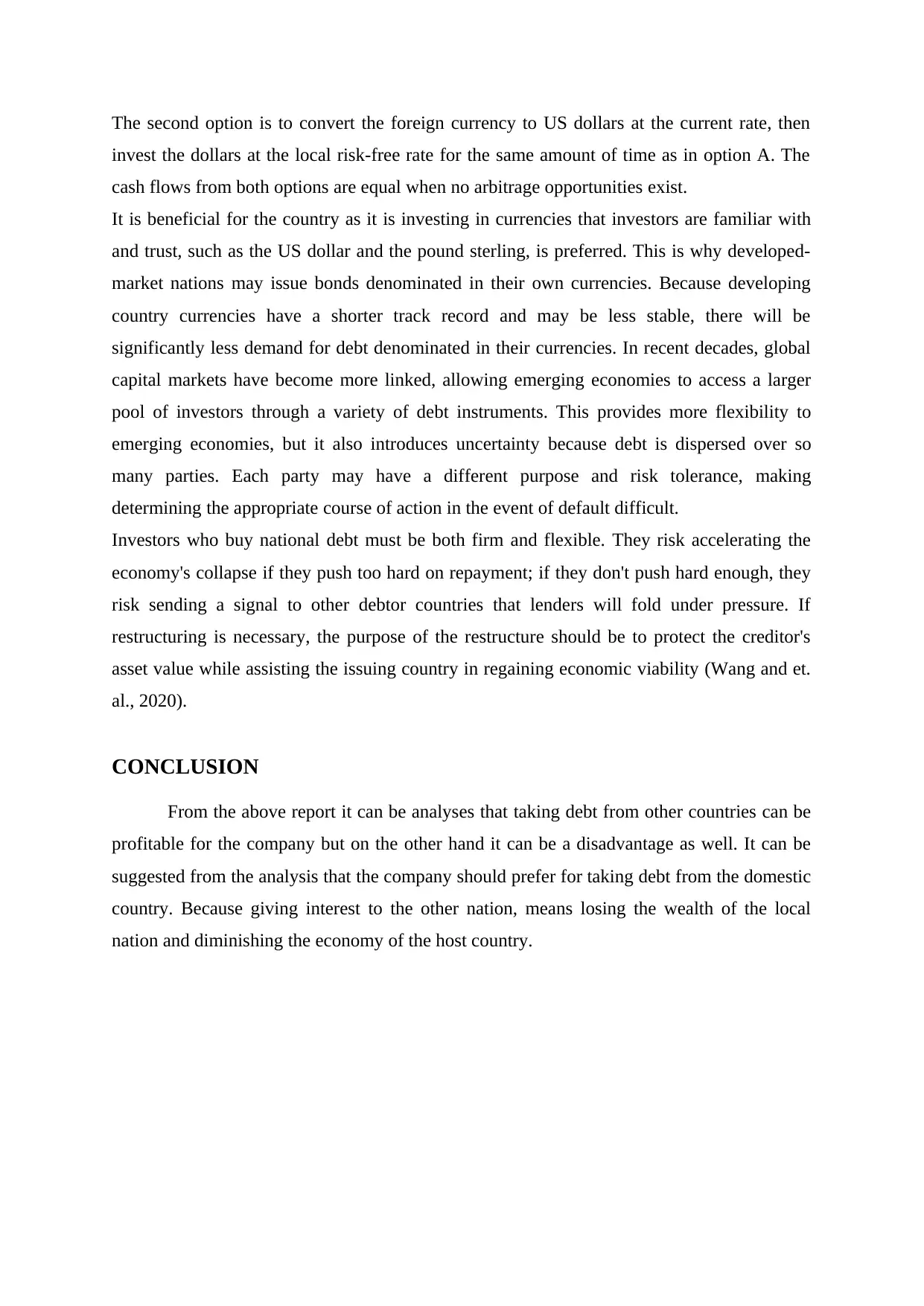
The second option is to convert the foreign currency to US dollars at the current rate, then
invest the dollars at the local risk-free rate for the same amount of time as in option A. The
cash flows from both options are equal when no arbitrage opportunities exist.
It is beneficial for the country as it is investing in currencies that investors are familiar with
and trust, such as the US dollar and the pound sterling, is preferred. This is why developed-
market nations may issue bonds denominated in their own currencies. Because developing
country currencies have a shorter track record and may be less stable, there will be
significantly less demand for debt denominated in their currencies. In recent decades, global
capital markets have become more linked, allowing emerging economies to access a larger
pool of investors through a variety of debt instruments. This provides more flexibility to
emerging economies, but it also introduces uncertainty because debt is dispersed over so
many parties. Each party may have a different purpose and risk tolerance, making
determining the appropriate course of action in the event of default difficult.
Investors who buy national debt must be both firm and flexible. They risk accelerating the
economy's collapse if they push too hard on repayment; if they don't push hard enough, they
risk sending a signal to other debtor countries that lenders will fold under pressure. If
restructuring is necessary, the purpose of the restructure should be to protect the creditor's
asset value while assisting the issuing country in regaining economic viability (Wang and et.
al., 2020).
CONCLUSION
From the above report it can be analyses that taking debt from other countries can be
profitable for the company but on the other hand it can be a disadvantage as well. It can be
suggested from the analysis that the company should prefer for taking debt from the domestic
country. Because giving interest to the other nation, means losing the wealth of the local
nation and diminishing the economy of the host country.
invest the dollars at the local risk-free rate for the same amount of time as in option A. The
cash flows from both options are equal when no arbitrage opportunities exist.
It is beneficial for the country as it is investing in currencies that investors are familiar with
and trust, such as the US dollar and the pound sterling, is preferred. This is why developed-
market nations may issue bonds denominated in their own currencies. Because developing
country currencies have a shorter track record and may be less stable, there will be
significantly less demand for debt denominated in their currencies. In recent decades, global
capital markets have become more linked, allowing emerging economies to access a larger
pool of investors through a variety of debt instruments. This provides more flexibility to
emerging economies, but it also introduces uncertainty because debt is dispersed over so
many parties. Each party may have a different purpose and risk tolerance, making
determining the appropriate course of action in the event of default difficult.
Investors who buy national debt must be both firm and flexible. They risk accelerating the
economy's collapse if they push too hard on repayment; if they don't push hard enough, they
risk sending a signal to other debtor countries that lenders will fold under pressure. If
restructuring is necessary, the purpose of the restructure should be to protect the creditor's
asset value while assisting the issuing country in regaining economic viability (Wang and et.
al., 2020).
CONCLUSION
From the above report it can be analyses that taking debt from other countries can be
profitable for the company but on the other hand it can be a disadvantage as well. It can be
suggested from the analysis that the company should prefer for taking debt from the domestic
country. Because giving interest to the other nation, means losing the wealth of the local
nation and diminishing the economy of the host country.
Paraphrase This Document
Need a fresh take? Get an instant paraphrase of this document with our AI Paraphraser
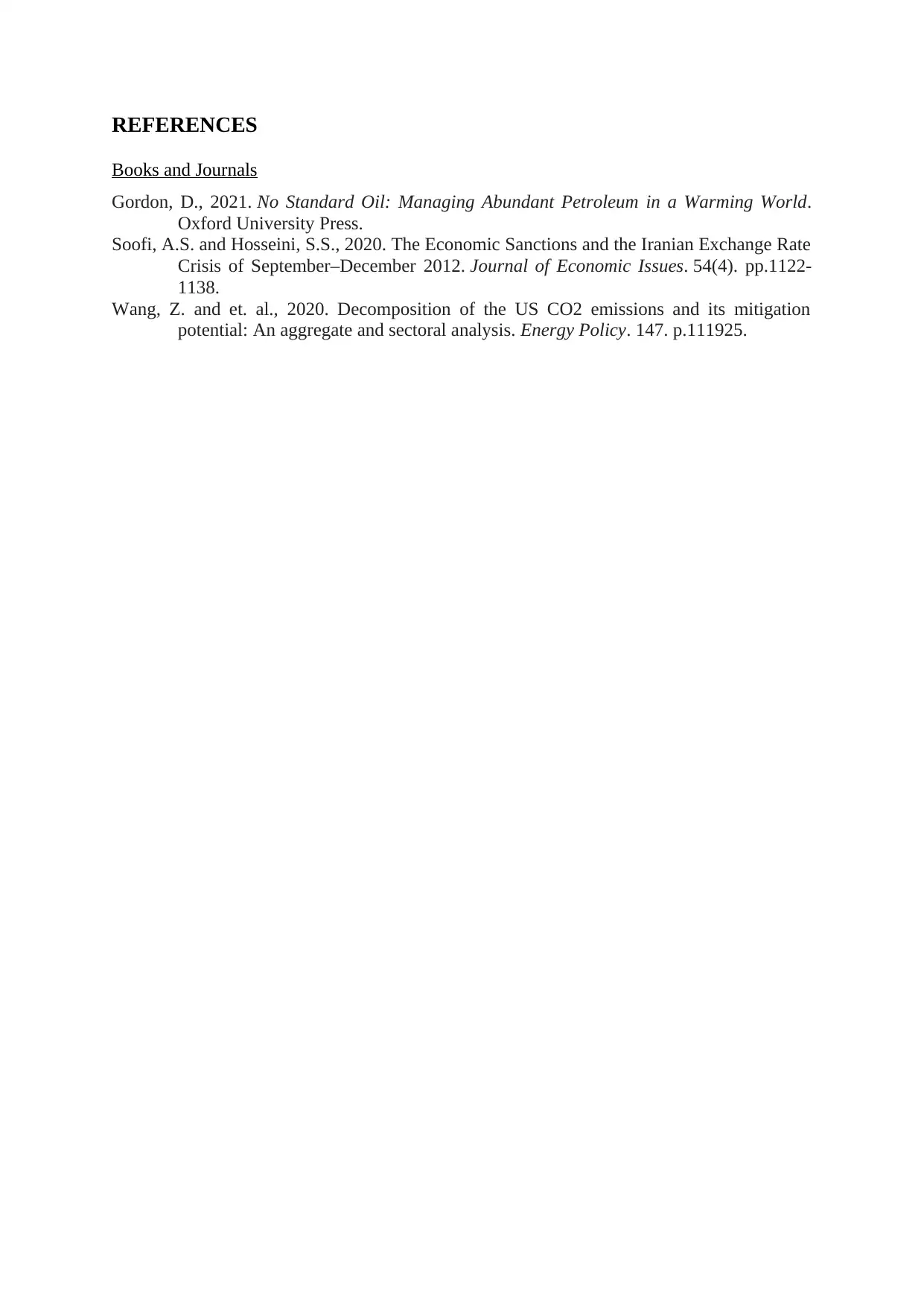
REFERENCES
Books and Journals
Gordon, D., 2021. No Standard Oil: Managing Abundant Petroleum in a Warming World.
Oxford University Press.
Soofi, A.S. and Hosseini, S.S., 2020. The Economic Sanctions and the Iranian Exchange Rate
Crisis of September–December 2012. Journal of Economic Issues. 54(4). pp.1122-
1138.
Wang, Z. and et. al., 2020. Decomposition of the US CO2 emissions and its mitigation
potential: An aggregate and sectoral analysis. Energy Policy. 147. p.111925.
Books and Journals
Gordon, D., 2021. No Standard Oil: Managing Abundant Petroleum in a Warming World.
Oxford University Press.
Soofi, A.S. and Hosseini, S.S., 2020. The Economic Sanctions and the Iranian Exchange Rate
Crisis of September–December 2012. Journal of Economic Issues. 54(4). pp.1122-
1138.
Wang, Z. and et. al., 2020. Decomposition of the US CO2 emissions and its mitigation
potential: An aggregate and sectoral analysis. Energy Policy. 147. p.111925.
1 out of 5
Related Documents
Your All-in-One AI-Powered Toolkit for Academic Success.
+13062052269
info@desklib.com
Available 24*7 on WhatsApp / Email
![[object Object]](/_next/static/media/star-bottom.7253800d.svg)
Unlock your academic potential
Copyright © 2020–2026 A2Z Services. All Rights Reserved. Developed and managed by ZUCOL.





